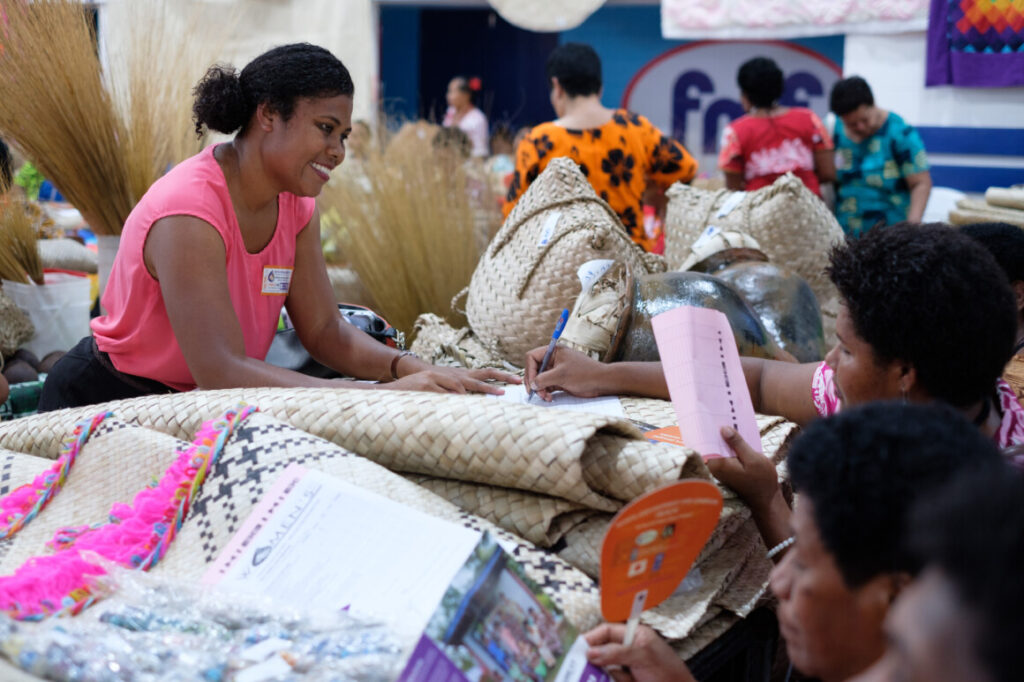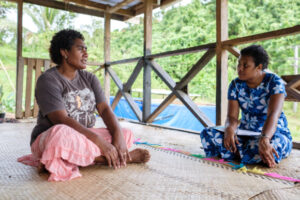Glorious and heartbreaking moments: musings of a Fijian community development advocate
July 3, 2020

By Kuini Rabo
2020 marks my second year at the Fiji Women’s Fund and in the last two years, I’ve had the opportunity to be part of the Fund’s second and third call for funding. Every year, the Fund puts out a call for funding inviting women’s groups, networks and organisations to apply for both financial and non-financial support to work towards progressing the rights of women, girls and gender non-conforming people.
Since the Fund’s inception in 2017, the Fund has disbursed FJD 1.35 million in grants to 25 organisations in Fiji. These grants have ranged from large organisations like the Fiji Women’s Right Movement and Medical Services Pacific to smaller rural-based women’s groups like Delailasakau Women’s Group in the District of Waidina in the province of Naitasiri.
There’s nothing quite like the feeling you get witnessing what women can do when given the support that they define for themselves, especially for rural and remote women’s groups. Seeing the excitement on the faces of the members of the Naitasiri Women in Dairy Group when they harvested their first batch of oyster mushrooms or hearing the inspiring stories of Delailasakau Women’s Group who had to cross a river in the wee hours of the morning and travel from the interior of Fiji just to attend our grants information sessions. I’ve been fortunate to witness firsthand those glorious moments filled with so much power and resilience. I’ve also been part of heartbreaking moments, sharing the pain, anger and frustration with women’s groups who on a daily basis face so many barriers in realising their rights.
These experiences have greatly shaped the way I see my role at the Fund. Managing grants for me personally goes beyond keeping track of funds and ensuring grant requirements are met. I firmly believe in building relationships, having mutual trust, adopting a two-way learning process, sharing valuable ideas and working on solutions that our grantees may face.
As a Fund team, we recognise that there have been gaps in the women’s organisations and groups we have funded and the areas and communities that they serve. We discovered that while there are many women’s organisations, groups and networks in Fiji doing some amazing work and projects, they often don’t receive funding support or visibility because they lack the capacity to apply for funding opportunities. For instance, the lack of access to internet and phone connectivity has hindered information reaching these groups – imagine having to climb a hill trying to get one bar on your mobile phone just to make a call. That is the reality for many rural-based women’s groups.
From the beginning, the Fund knew that there was a need to reach rural and remote women and that one way of doing this is to provide as much information as possible in vernacular and in English about the application process. As such, the Fund used a two-step process through firstly the call for expressions of interest (EOI), followed by a full proposal development. At each step, my role has been to support the women applying, to understand the process and to facilitate their access to monetary and non-monetary resources through the Fund’s granting mechanism. If any group is unsuccessful in their EOI, we endeavour to still assist them by connecting them to other agencies who might be able to resource them or have given them feedback to strengthen their future proposals.

Our experience at the Fund has taught us that we must constantly listen, learn, adapt and shape our decisions based on the needs of the women that we work with. Women’s funds are well-positioned to engage with, support and strengthen women’s organisations, especially rural and remote organisations working with most marginalised populations like lesbian, gay, bisexual, and transgender (LGBT) sex workers.
Self-reflection is also key. In my time at the Fund, we have analysed our grants portfolio, taking a closer look at who and what we are funding. We have then asked ourselves to interrogate what we as a Fund can be doing to make our funding more accessible. For instance, an analysis of our second call for funding indicated that there were gaps – we simply weren’t reaching a wide cross-section of women. In 2019 we made changes to our third grants call to address those gaps and intentionally sought EOIs from women’s networks, groups and organisations targeting the following criteria:
- Based in the Northern and Eastern Divisions of Fiji
- Working with Fijian women from ethnic minority groups
- Working with gender non-conforming people or of diverse sexual orientation
Understanding that there would be different levels of capacity at these sessions, we made sure that we brought along information brochures, videos, PowerPoint presentations and printed hard copies of the application form. Where needed, we spoke in vernacular – Fijian and Hindi to ensure further understanding. Many rural groups used this opportunity to ask us questions on how to fill out the forms and submitted handwritten applications straight after the information sessions. In some areas, it was the Provincial Councils who provided the support to rural villages to scan and email applications to the Fund. Their eagerness and interest in our grants process show us that they are willing and committed to doing what is necessary to help their communities access these opportunities.
Our increased and targeted efforts last year, however, did not increase the participation of gender-non-conforming groups as we had hoped. After personally reaching out to many minority groups, we learned that due to their workload with other funding commitments, it had become difficult to cope with the requirements of multi-funders. Many organisations said they lacked the resources to take on any further community projects. We recognise the need to not overburden these organisations and when the time is right, we will be happy to re-engage with them in the future.
Often we get asked “why we would go to such lengths” or ‘’through so much trouble” to assist women’s groups the way we do. The answer is simple, this is the mandate of women’s funds – being able to mobilise all forms of resources and finding ways to making these resources flexible and accessible.
Over the past two years, I have seen the impact that our grants have had for the diverse women’s groups, networks and organisations. I am glad that I am part of this journey of the Fiji Women’s Fund, one of the very first national women’s funds in the Pacific region. In the coming months, the Fund will be making further changes to its grants mechanism based on the findings of the Mid Term Review. So, keep a lookout for our upcoming blog that explains the changes and the rationale behind it all.
About the Author
Kuini is an avid runner and adventure seeker and can be found on weekends dedicating her time to community service. Kuini has over 10 years experience working with communities, specifically women networks in Fiji and the Pacific. She has also managed gender and energy projects and is experienced in aid coordination. Kuini has previously worked with the Secretariat of the Pacific Community, University of the South Pacific and with the Government of Fiji.
4 responses to “Glorious and heartbreaking moments: musings of a Fijian community development advocate”
Leave a Reply
Recent Whats New
WFF Visit to “Rise Beyond the Reef”
December 12 2023
LifeBread Confident Woman Program Graduation
December 12 2023

I so love the story published, it so relates to remote parts of Papua New Guinea especially in terms of access to funding for CBOs women’s groups. The remoteness and accessibility to media connections is such a struggle and needs an inch more of an effort to make funding accessibility to them.
Kudos to the team for the great work!
Cheers
Bula my name is Siteri and I live in Nawaka Nadi. We are a group of women doing a lot of selling from making roti parcels to tamarind chutney jams and more. We are not registered yet..but we need your help. Due to this pandemic we are very much in need
for your support to our families. Vinaka
Vinaka FWF
Vinaka Kuini Rabo
The help ure given us the rural women of Naitasiri has change and has shown a different view of us women in our community
Vinaka
Bula vinaka FWF.
First I am so grateful to the way the organization approach and assist us, women in Fiji especially in remote rural areas. I’m the Chief Center of a group of women based in a village and the group is a member of the South Pacific Business Development. We consist of eleven members and it would be much appreciated if we could be funded and assisted from FWF. As of now I may say that we dont have much resources but we have the skills and we are very much talented. Vinaka vakalevu.